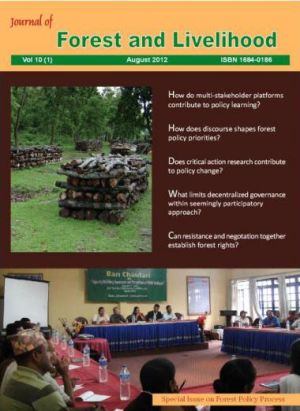Can Policy Learning be Catalyzed? Ban Chautari Experiment in Nepal's Forestry Sector
DOI:
https://doi.org/10.3126/jfl.v10i1.8598Keywords:
ban chautari, policy learning, diagnostic study, collaborative leadership, deliberative processAbstract
Over the past several years, technocratic approaches to forest policy have been challenged and more collaborative processes have been advocated. While these shifts have offered significant space for citizen engagement at local level – such as through community based forest management in Nepal’s case – these have not taken roots at higher levels of policy making, especially at the level of formulating or revising legislations, or setting up a protected area. In this paper we critically review a collaborative experiment on catalyzing deliberative policy learning process in Nepal’s forest sector. We examine how and to what extent such experimentation could overcome seven identified challenges to forest policy deliberation in Nepal. The experiment, which we named as Ban Chautari, involved three key strategies – conducting diagnostic research, empowering local communities to articulate their voices in deliberative forums, and then acting collaboratively across diverse institutional groups. Our examination of the Ban Chautari process focused around three research questions: a) How can policy learning be catalyzed?; b) How can actors with differentiated capacity and resources collaborate in the policy process?; and c) How can research processes be re-organized so as to contribute effectively to constantly shifting policy agendas and rapidly changing contexts? The experience of Ban Chautari has some good news to share with the wider public policy research community that conditions for collaborative policy learning is possible. And at the same time, it has generated evidence that warns the advocates of participatory and collaborative policy processes on the more subtle, and fundamental challenges that surround any attempts to foster collaborative learning.
DOI: http://dx.doi.org/10.3126/jfl.v10i1.8598
Journal of Forestry and Livelihood Vol.10(1) 2012 1-27
Downloads
Downloads
Published
How to Cite
Issue
Section
License
CC-BY-NC: This license allows reusers to distribute, remix, adapt, and build upon the material in any medium or format for noncommercial purposes only, and only so long as attribution is given to the creator.





